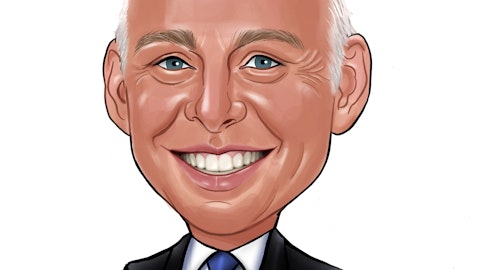Typically, examining insider selling should be part of an investors’ stock selection and evaluation process, but this type of activity should be accurately and properly interpreted. Insiders sold roughly 27-times more stock than they bought last week, in terms of value, which understandably does not represent reason for optimism. Even more to that, the ratio of insider selling over insider buying has been very high over the past several weeks and months, which is not surprising if considering the market rally we have seen over the past several years. Nevertheless, insiders can cash out their holdings for a wide range of reasons that might not necessarily be related to their companies’ current valuations and future prospects, so insiders’ sales should not always be perceived as an automatic bearish sign. Having this in mind, this article will deliberate on the insider selling registered at three companies and the recent performance of the companies in question.
Prior to discussing the insider trading activity, let’s make you familiar with what Insider Monkey does besides providing high-quality articles. At Insider Monkey, we track hedge funds’ moves in order to identify actionable patterns and profit from them. Our research has shown that hedge funds’ large-cap stock picks historically underperformed the S&P 500 Total Return Index by an average of seven basis points per month between 1999 and 2012. On the other hand, the 15 most popular small-cap stocks among hedge funds outperformed the S&P 500 Index by an average of 95 basis points per month (read more details here). Since the official launch of our small-cap strategy in August 2012, it has performed just as predicted, returning 102% and beating the market by more than 53 percentage points. We believe the data is clear: investors will be better off by focusing on small-cap stocks utilizing hedge fund expertise (while avoiding their high fees at the same time) rather than large-cap stocks.
To start with, Exxon Mobil Corporation (NYSE:XOM) is one of the companies that had some insider trading activity on the sell side last week. Senior Vice President Mark W. Albers sold 12,500 shares during the post-Thanksgiving session at a price of $80.50 per share, cutting his stake to 709,788 shares. He also owns an indirect ownership stake of 20,772 shares. The shares of the world’s largest publicly-traded international oil and gas company are 12% in the red this year and are trading at a trailing price-to-earnings ratio of 17.17, which is substantially below the average of 23.18 for the companies included in the S&P 500 Index. Even so, one should not solely rely on this valuation metric when assessing a potential investment in Exxon Mobil Corporation (NYSE:XOM), as it does not take into account the impact of the low oil-price environment on the earnings potential of the company. Exxon’s third quarter earnings added up to $4.2 billion or $1.01 per diluted share, compared to $8.1 billion reported in the same quarter last year. The company’s depressed Upstream results overshadowed the higher earnings generated from the Downstream and Chemical business segments. The number of hedge funds from our databased with positions in the oil and gas company decreased to 61 from 67 during the third quarter. Richard S. Pzena’s Pzena Investment Management owned a 6.11 million-share position in Exxon Mobil Corporation (NYSE:XOM) on September 30, making it one of the largest equity holders of the company.
Follow Exxon Mobil Corp (NYSE:XOM)
Follow Exxon Mobil Corp (NYSE:XOM)
Receive real-time insider trading and news alerts
Let’s move on to the second page of this daily insider trading article, where the insider selling activity at Campbell Soup Company (NYSE:CPB) and Primerica Inc. (NYSE:PRI) is discussed.
Campbell Soup Company (NYSE:CPB) has recently witnessed insider trading activity for the first time in 2015. President and Chief Executive Officer Denise M. Morrison discarded 79,250 shares on Friday at a weighted average price of $53.07. The CEO currently holds an ownership stake of 495,216 shares. The shares of the manufacturer and marketer of branded convenience food products have advanced by nearly 21% since the beginning of the year and are trading at a price level not seen since 1998. At the end of November, Credit Suisse lifted its price target on Campbell Soup to $50 from $48, but reiterated its ‘Underperform’ rating, citing better-than-expected fiscal year 2016 first quarter earnings results. Even so, Credit Suisse’s analysts still anticipate restrained sales growth. Meanwhile, the stock is trading at a relatively rich trailing P/E ratio of 25.53, which might explain the CEO’s decision to cash out a portion of her holdings. The company’s adjusted gross margin strengthened significantly year-over-year despite facing cost inflation, mainly owing to productivity improvements, higher selling prices, enhanced supply chain performance and lower promotional spending. The food manufacturing company received more attention from the hedge funds tracked by Insider Monkey during the third quarter, as the number of smart money investors with positions in the company climbed to 25 from 20 quarter-over-quarter. Renaissance Technologies acquired a 234,400 share-stake in Campbell Soup Company (NYSE:CPB) during the September quarter.
Last but not least, Primerica Inc. (NYSE:PRI)’s Director Donald R. Williams reported selling 28,239 shares on Tuesday at $49.74 apiece, trimming his overall holdings to 20,791 shares. Slightly more than a week ago, another Member of the company’s Board of Directors also discarded some shares, but the sale was conducted under a trading plan. The shares of the distributor of financial products to middle income households in the U.S and Canada have embarked on a wobbly upward trend since August, but are still down by 5% for the year. Nonetheless, shares of Primerica have gained 121% over the past five years. Despite that, they still look quite attractive if solely looking at the company’s trailing P/E ratio of 14.36. Primerica’s third quarter investment and savings products sales decreased by 1% year-over-year to roughly $1.4 billion, which might reflect the slower pace of the U.S jobs market. 15 hedge funds monitored by our team were invested in the company at the end of the third quarter, and had accumulated 11.90% of its outstanding common stock at that time. Glenn Greenberg’s Brave Warrior Capital owns 3.11 million shares of Primerica Inc. (NYSE:PRI) as of September 30.
Follow Primerica Inc. (NYSE:PRI)
Follow Primerica Inc. (NYSE:PRI)
Receive real-time insider trading and news alerts
Disclosure: None





